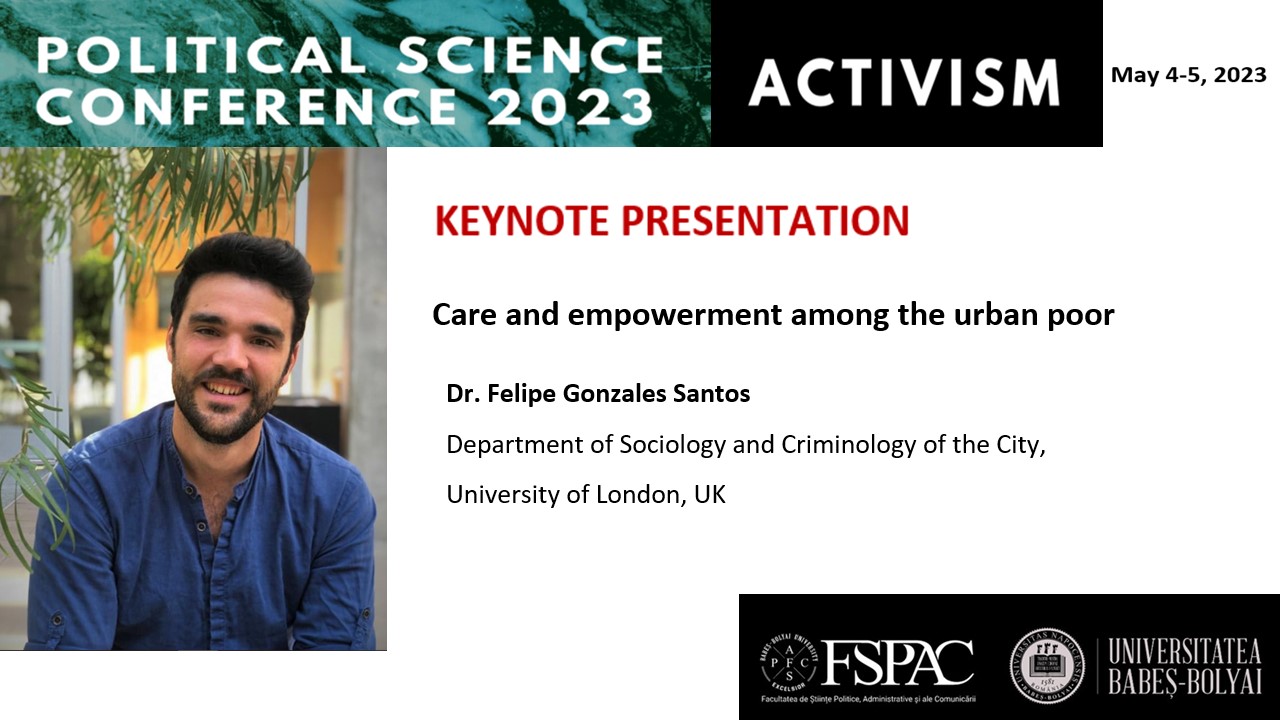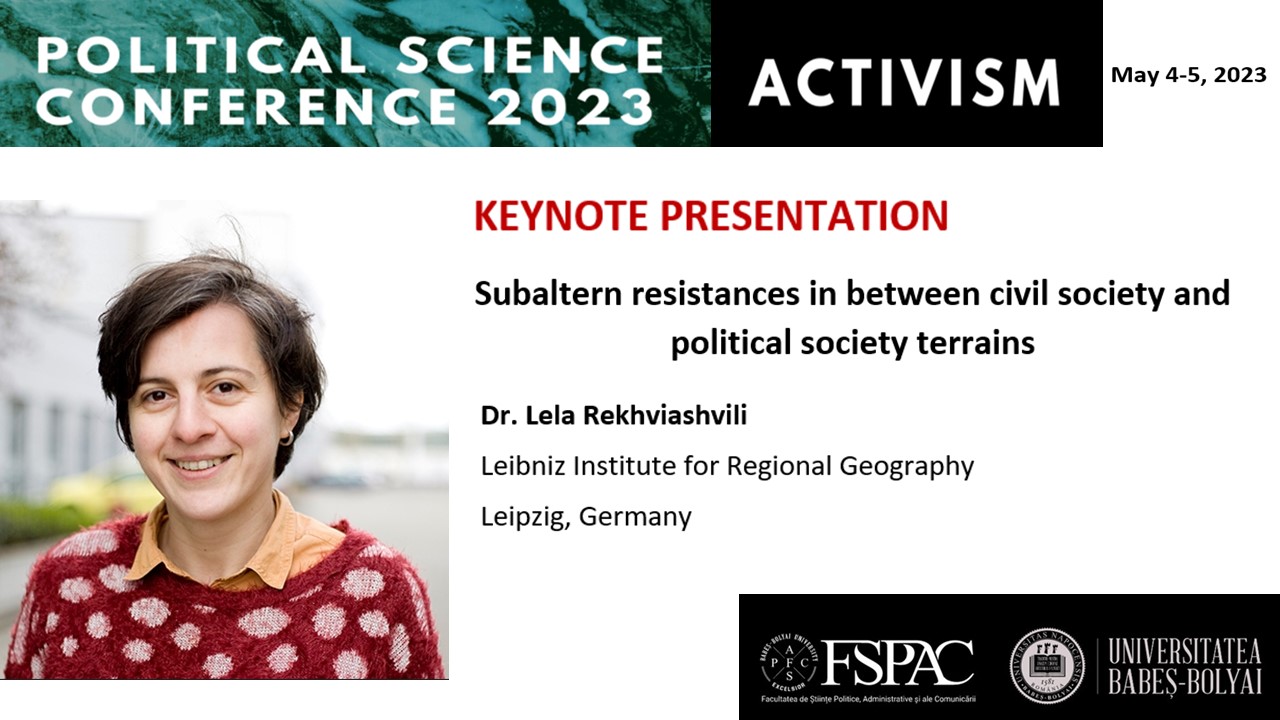

RO: Dr. Felipe Gonzales Santos (Department of Sociology and Criminology of the City, University of London) va participa în calitate de Keynote Speaker la Conferința ACTIVISM organizată de Departamentul de Științe Politice din cadrul FSPAC, cu prezentarea „Care and empowerment among the urban poor.”
EN: Dr. Felipe Gonzales Santos (Department of Sociology and Criminology of the City, University of London) is one of the Keynote Speakers in the ACTIVISM Conference organized by the Department of Political Science at FSPAC. Dr. Gonzales Santos will deliver the presentation „Care and empowerment among the urban poor.”
Dr. Felipe Gonzales Santos is Postdoctoral Research Fellow at the Department of Sociology and Criminology of the City, University of London. He is the recipient of the Young Scholar Award 2021 of the European Sociological Association, as well as the Outstanding Dissertation Award of the Doctoral School of Political Sciences, Public Policy and International Relations of the Central European University. Felipe is interested in how different social groups and political ideologies push for long-lasting societal changes, and how their actions affect the health of our democracies. His research covers social movements and political parties, as well as their supporters, spanning from the left to the far-right. On these topics, he has authored journal articles in leading journals, including Communication Methods and Measures, International Affairs, European Journal of Cultural and Political Sociology, and Social Movement Studies, edited a collective volume, and written a number of book chapters, including a contribution to the world-renown Wiley-Blackwell Encyclopedia of Social and Political Movements.
This talk will delve into the implications of home foreclosures beyond the risk they pose to people’s housing and how social movement organizations empower those facing eviction to take ownership of their struggle and confront the financial corporations threatening their livelihood. It will argue that certain grievances destabilize people’s lives to a degree that they prevent them from taking action. Before being able to take ownership of their struggle, many aggrieved communities must go through a ‘caring phase’, where some of their emotional, identity and participatory needs are covered. From the frameworks of the Politics of Care the talk will identify some challenges that hamper the mobilization of heavily aggrieved groups, and map how organizations care for their members and empower them to take ownership of their struggle and contribute to the goals of their collective. The case of the Platform of Those Affected by Mortgages, the biggest housing organization in Spain, will serve to illustrate these dynamics.
RO: Dr. Lela Rekhviashvili (Leibniz Institute for Regional Geography, Leipzig, Germania) va participa în calitate de Keynote Speaker la Conferința ACTIVISM organizată de Departamentul de Științe Politice din cadrul FSPAC, cu prezentarea „Subaltern resistances in between civil society and political society terrains.”
EN: Dr. Lela Rekhviashvili (Leibniz Institute for Regional Geography, Leipzig, Germany) is one of the Keynote Speakers in the ACTIVISM Conference organized by the Department of Political Science at FSPAC. Dr. Rekhviashvili will deliver the presentation „Subaltern resistances in between civil society and political society terrains.”
Dr. Lela Rekhviashvili is a researcher at Leibniz Institute for Regional Geography. Her research focuses on political-economy and regional geography with a regional expertise in post-socialist Eastern Europe and Eurasia, particularly South Caucasus and Central Asia. She has published on informal economic practices, urban transport and mobility, marketization and social embeddedness, social movements and politics of public space. Her research increasingly focuses on contestations around infrastructure-led development and role of infrastructures in imagining and (re-)claiming socialist and capitalist modernities. As an invited lecturer at Universities of Jena and Leipzig she teaches ‘Regional Geography of Post-Soviet Eurasia’ and ‘De/constructing Europe: Multiple perspectives on Europeanisation’. She serves as one of the coordinators of research area ‘Self-Positioning of Eastern Europe in a New World Order’ at Leibniz Science Campus »Eastern Europe – Global Area« (EEGA).
The alleged lack of civil society has become one of the key markers of the ‘relative backwardness’, or the institutional or cultural ‘deficiencies’ of East European societies vis-à-vis the West. Over the past decades, post-socialist civil society has been condemned as ‘weak’ in liberal readings and as elitist and donor dependent in critical and leftist readings. To overcome the narrative of ‘weak’ civil society recent scholarship has insisted on broadening the concept of civil society to include invisible struggles, informality, infrapolitics and everyday resistances. I argue against such charitable broadening of the concept of civil society and offer an alternative conceptualization of social movements and everyday resistances with the help of Patra Chatterjee’s concept of political society. By drawing on the example of the struggle to defend the Rioni valley against a large hydropower plant project Georgia, I show that civil society, this alleged central avatar of the politics of resistance, is a battlefield in itself. Framing resistances as being outside of the civil society, uncivil, pre-modern, and backward, is the strategy of the state to justify violence and repressions against resisting populations. In other words, the subalternity of certain groups, their epistemic displacement, emphasizing their non-compliance with the existing legal-institutional order, and suppressing their voices in the public space is carried out by expelling them from the civil society terrain. Those kinds of excluded groups, that are denied access to conventional channels of democratic engagement and are stripped of civil rights, are left to organize on the terrain of political society, that is, on the terrain of alternative values, torn from the existing institutions and structures. In other words, political society is a terrain of mobilization for subaltern groups that are actively removed from the possibility to fight on civil society terrain. The experience of the Riony valley struggle illustrates that moving beyond the political society terrain, destabilizing the very concept of civil society, instead of "strengthening" civil society or simply attaching this label to oneself, appears to be the way to confront the hegemonic order today. The alliances of subaltern movements with middle-class civil society groups can help in overcoming delegitimization and undermine hegemonic developmental projects. Yet, such alliances remain precarious in the light of structural differences between subaltern politics and the politics of westward looking and donor-driven civil society.
